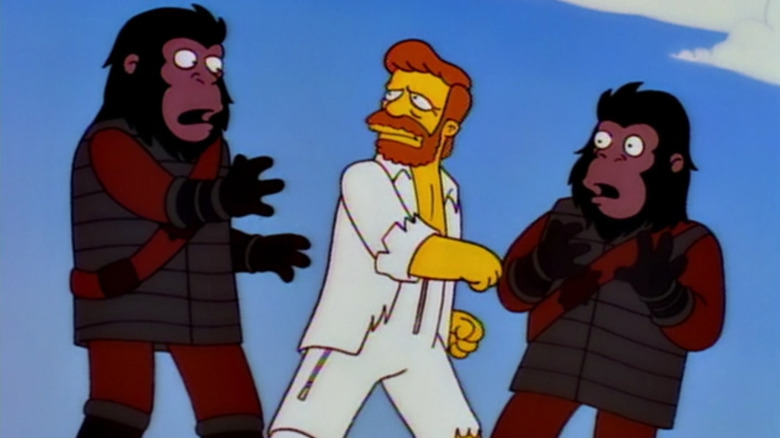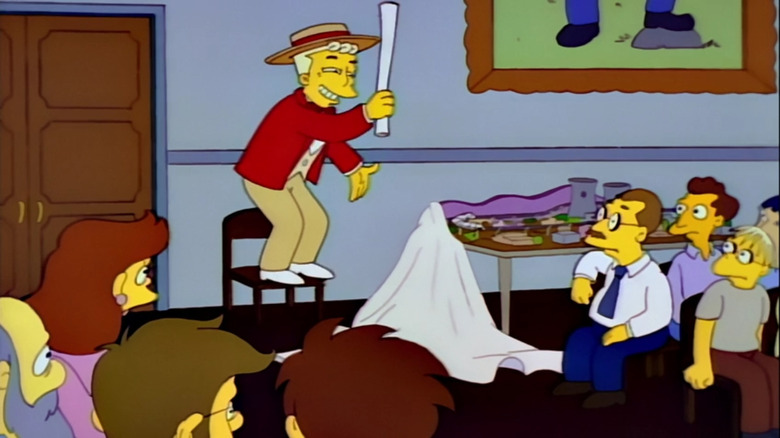Here's How The Simpsons' Many Musical Numbers Are Actually Written
Do you like the Stonecutters song? How about "See My Vest"? Were you impressed when Bart Simpson and Michael Jackson sang a birthday song to Lisa? How do you feel about the celebrity-laced barn-burner "We're Sending Out Love Down the Well"? Do you like the stage musicals of "Checking In," or "Stop the Planet of the Apes! I Want to Get Off!"? I'm personally fond of the song about Spirngfield's brothel, "Spring in Springfield," a throwback to bawdy farces of the 1930s. And who could forget when Lyle Lanley led the entire town in a musical number about a monorail? Or when Homer, Apu, Seymour Skinner, and Barney formed a barbershop quartet to perform "Baby on Board"?
Point being "The Simpsons" has featured many, many original songs in its 850-year tenure on television, and that doesn't even count the hit record "The Simpsons Sing the Blues" from 1990. Many of the show's memorable ditties were compiled on three CDs: "Songs in the Key of Springfield" in 1997, "Go Simpsonic with the Simpsons" in 1999, and "The Simpsons: Testify" in 2007. All three of those albums featured the show's full orchestra playing over many witty lyrics provided by the brilliant "Simpsons" writers. All told, the three records feature 133 tracks.
Why so much music? The obvious answer is that music is life and comedy music is the blood in your veins. In the "Simpsons" retrospective book "Springfield Confidential" by Mike Reiss and Mathew Klickstein, a more practical answer is given. A song can eat up a good deal of an episode's runtime and offer crucial padding to anything that might be running short.
Dr. Zaius, Dr. Zaius
Reiss explains in his book that the lyrics for the many "Simpsons" songs are typically written into the scripts by the show's writers. They type out little poems, usually with a note that it should sound like an existing song, or serve as a straight-up parody that uses the same melody. Either way, the poems are given a meter and a rhythm that matches a real song. Jeff Martin, for instance, wrote a full-on musical rendition of "A Streetcar Named Desire." The music is then provided by Alf Clausen, the show's main composer from 1990 through its 28th season in 2017.
Reiss feels that songs are essentially a great way for writers to take a break and not have to workshop and re-workshop their work all the time. He describes the job of "Simpsons" writers as "shoveling jokes into a 22-minute ditch every week." This described the show's tendency to cut the bulk of gags pitched in the writers' room. For every joke that makes it to air, at least five or six others are shoveled into the ditch, never to be seen again. Songs, on the other hand, take up so much time that producers tend to let them remain in the script as they were written. It may seem like more work to write and perform a song, but it sounds like the opposite.
Also, because of the way writing royalties work, the songwriters get extra "songwriter" money in the mail every time the song is played on the air. Reiss explains that he's technically a credited songwriter on "Spider-Pig" from "The Simpsons Movie," even though he claims to have not been in the room when it was written. He was happy to receive the scant royalties checks every year, though.
The ring came off my pudding can!
Reiss did note that at least one song never made it to air. Indeed, he recalled a song sung by Patty and Selma (both played by Julie Kavner) wherein the sisters sing about how much they love to smoke cigarettes. The melody was to imitate "I Love to Laugh," the Sherman Bros. song from "Mary Poppins." Fans of "The Simpsons" know, however, that Patty and Selma have raspy voices ruined by years of smoking. Reiss said they recorded the song, found that listening to Patty and Selma singing was wholly unpleasant, and cut the song.
The "Simpsons" writers also write lyrics for any guest singers that might appear on the show. In the 2003 episode "Three Gays of the Condo," "Weird Al" Yankovic appears to sing a spoof of John Mellencamp's "Jack and Diane" called "Homer and Marge." Yankovic typically writes his own parodies and is even quite careful to scan fan mail for parody "suggestions," lest he be nailed for plagiarism. "Homer and Marge" was written by Matt Warburton. For a special Hollywood Bowl show in 2014, "Weird Al" performed an extended version of the song, although it's unclear if Warburton or Yankovic wrote the expansion. For legal reasons, I assume it was Warburton.
So the next time you are impressed by an animated show's ability to insert a high volume of songs into their repertoire, know that it's easier to do that than to fill the same three minutes with jokes, gags, and dialogue.


